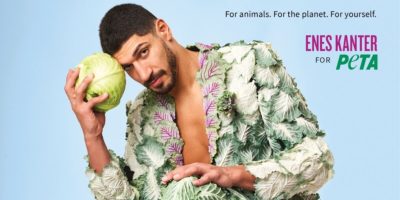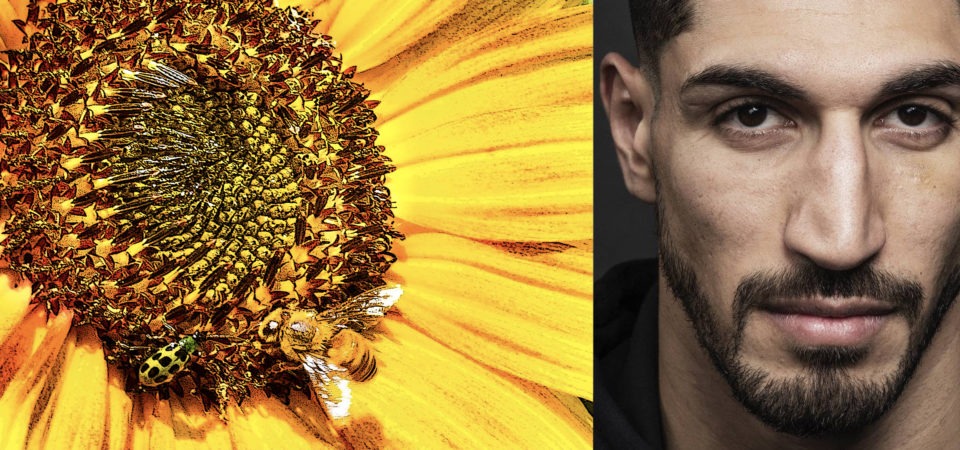Geoffrey Holland – You were born in Switzerland, you grew up in Turkey and you’ve become well known as a sports star in the NBA. How has that shaped your worldview?
Enes Kanter – Because of basketball, I have lived in many places, some good, some bad, and I have traveled pretty much all around the world. So, I have a global perspective of the big problems. You know, I am always thinking about human rights issues in countries around the globe. In my own home country of Turkey, I have spent most of my adult life fighting for human rights. Thousands of innocent people were jailed, and lots of political prisoners and journalists are in jail right now. But you know, I’m so privileged to be able to play professional basketball. It’s the best thing in the world, but I always remember the struggles of my homeland. So, I feel grateful that I can use my brief time on the sports platform to draw attention to human rights, animal rights, and equal justice for all.
GH – You were recently featured in a PETA promotion that focuses on how you’ve moved to a plant-based diet, and you’re urging others to try the same. What brought you to that decision?
EK – When I started to educate myself about animal agriculture, I learned that it has a direct impact on so many global issues, including world hunger and climate change. And, you know, the animal abuse is horrible. In fact, there are one billion people in the world who are starving, and yet 50% of the grains and legumes in the world are fed to animals we humans breed to kill and eat. That is something that I do not want to support. We don’t need to eat animals to be healthy. In fact, it’s more healthy not to eat animals. Also, as I said, there is a lot of cruelty towards the animals humans choose to eat. It’s clear that we need to come up with a new way to feed our world. We can easily get along without eating meat, and it’s more healthy. So that was why I chose to work with PETA. I want to be a good example by the way I live.
GH – Of all the threats to life on Earth, you have said, climate change may be the most in need of attention? Why is climate change such a danger? And what do you think policymakers should do about it?
EK – If you look at the world right now, we are already seeing the destructive impacts of climate change. You know, California and Australia, and even the cold Arctic, are now having giant wildfires. In other places, it’s flooding, big floods like in Houston a few years ago. All over the world, this is happening: extreme weather, like super-hurricanes. All because we are pumping way too much heat-trapping pollution into the atmosphere we all share. We have to change this. I live in America. When a wildfire happens, I feel a pain in my heart. I feel pain for the planet. Policymakers should be looking at ways to reduce climate pollution, not just with clean energy, but also with taking a hard look at animal agriculture.
GH – The world is increasingly divided politically, with a modest share of humanity surviving comfortably. Basically, that would be Europeans, North Americans, some Asian countries, and a few other places. But most people are not doing well at all. A billion humans around the world suffer from chronic hunger and food insecurity. How do we fix that?
EK – I was doing some research this year. Let me just give you some real facts. World hunger is one of the reasons I decided to go to a plant-based diet. Around the world, a billion humans are starving. At the same time, 50% of the grains and legumes we grow are being fed to livestock animals that get slaughtered for human consumption. You could feed a lot of people with the grain we feed to cattle and other farm animals. The way we feed ourselves is wrong. In the world, a child dies of hunger every 2.3 seconds. This is a disgrace. On one acre of land, you can produce just 250 pounds of beef, or on that same acre, you can grow more than 50,000 pounds of tomatoes, potatoes, or some other food crop. So, with our human population approaching almost 8 billion, and maybe to 10 billion by 2050, to feed everybody, you have to look at going to a plant-based diet. This is how you show compassion for people, who are now going hungry, and for our planet, which we humans are exploiting way too much.
GH – The earth environment we all depend on has been severely damaged by human overreach, how do we inspire our children to care about and deal with the mess our ancestors and our elders have made?
EK – The important thing is to start leading by example. We cannot just leave our mess for our children or our grandchildren to clean up. It has to start with us. Issues such as climate change will be inherited by future generations. That means those of us that are here now are obligated to deal with these problems now. That is one of the biggest reasons that I transitioned to plant-based eating. This is an easy step we all can take. I feel like education is really important and using the media platform to inspire positive change. We need to use social media, you know, whatever we can do, to talk about these things. We need to make our world work for everybody. We are all in this together.
GH – You have expressed great concern about how humans treat animals and nature. What kind of relationship should humans have with nature?
EK – First of all, we have to realize that as human beings we are part of nature. We are not above nature. We are not superior to nature. We are part of nature. Earth is the only home we have. Humans cannot live on the Moon or on Mars. For now, at least, this planet is our only home. We are destroying our own home. We have already seen that humans can cause a pandemic like Covid-19. It came from a wild animal market in China: people eating wild animals. Swine flu I believe came from American pig farms, and bird flu, Ebola, and SARS are zoonotic diseases that came out of how humans treat animals. So, I believe we must live in balance with nature, and with respect for nature. If we don’t change our ways, the coming generations will all pay a heavy price.
GH – You have also been an active voice for political prisoners around the world. How big is the problem of political oppression, and what do you urge people to do about it?
EK – This is a really good question. In my home country, Turkey, innocent people, professors, lawyers, journalists, you know, free thinkers are in jail for just speaking out against the government; just for trying to exercise free speech. My own father was a political prisoner. Just because I talk about issues, you know, they canceled my passport. They put my name on the RAD notice, just because I express my views on issues. They sent the police to my house in Turkey. They raided my house. We just need to keep standing up against oppressors. We must never be silent about injustice. In the end, I am a basketball player. I believe that God gave me this platform to stand up for all those innocent people, whose voices are oppressed.
GH – How do you see the obligation of celebrities and professional athletes like yourself, to use your fame to serve a greater good?
EK – If a person is blessed to have a platform, they should use it to help others. Anyone who has a platform has an obligation to use it, use it to educate and inspire the public. Professional athletes, rappers, singers, famous actors like George Clooney. These people are respected and followed by so many fans. We must use our platform particularly to inspire young people. They are facing so many problems It’s about educating people, inspiring people, encouraging people to be brave and stand against the bad things like climate change that are happening. To those of us who are celebrated for whatever reason, I say, just go out there; speak your mind and stand up for what’s right.
GH – Can you talk about the professional athletes that have inspired your own activism for nature, people, and the planet?
EK – I have lots of respect for many athletes. There are so many athletes out there, like the sisters Serena and Venus Williams. They talk about animal abuse and factory farm systems. There are so many athletes who support those who step up and talk about not just sports and not just, you know, having a good game or playing good or bad, but talk about the bigger things – what is happening in the world, good and bad.
GH – As planetary citizens, what kind of world should we all be working for?
EK – We must work together for a more equal and peaceful world. For a world where no humans are starving and no one is denied basic human rights. This is a world I work for every day. We all need to work for kindness and decency. We must do this together. The keyword is, together. It doesn’t matter what your religion is. It doesn’t matter what your gender, your skin color, or your culture is. We are all standing together as citizens of planet Earth. We must focus on all that we have in common. We only have one world. We have to find ways to live together and take care of our home. Earth is our home. Everything starts with us. There’s a really good saying when sometimes it seems like things are impossible. When we think about how to make a better world, we must remember that every journey of 1000 miles, however long or difficult, begins with a single step. So, let’s not just start slowly. Ask the question of yourself, “what am I doing today to help the world to be a better place” because the earth is our home. We have to treat our home planet the best way possible.
 Enes Kanter is a 6’11” Center for the NBA Portland Trailblazers. He is also a committed champion for nature, people, and the planet.
Enes Kanter is a 6’11” Center for the NBA Portland Trailblazers. He is also a committed champion for nature, people, and the planet.
The MAHB Blog is a venture of the Millennium Alliance for Humanity and the Biosphere. Questions should be directed to joan@mahbonline.org
The views and opinions expressed through the MAHB Website are those of the contributing authors and do not necessarily reflect an official position of the MAHB. The MAHB aims to share a range of perspectives and welcomes the discussions that they prompt.
